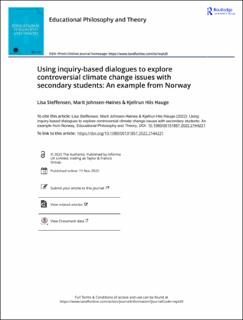| dc.contributor.author | Steffensen, Lisa | |
| dc.contributor.author | Johnsen-Høines, Marit | |
| dc.contributor.author | Hauge, Kjellrun Hiis | |
| dc.date.accessioned | 2023-02-22T14:17:32Z | |
| dc.date.available | 2023-02-22T14:17:32Z | |
| dc.date.created | 2022-11-12T08:17:57Z | |
| dc.date.issued | 2022 | |
| dc.identifier.issn | 0013-1857 | |
| dc.identifier.uri | https://hdl.handle.net/11250/3053378 | |
| dc.description.abstract | Young people around the world show considerable engagement with climate change. How can education draw on this engagement in order to benefit students and society? In this article, we discuss how inquiry-based dialogues can support students’ development in their societal engagement. We argue that such dialogues should include real-world problems involving disagreement, which promote students’ agency. We elaborate on qualities of dialogues, such as developing argumentation and perspectives together through respect, attentive listening and recognition of others’ viewpoints. Central theoretical perspectives include inquiry-based dialogues and students’ lived democracy. This research draws on data from a classroom activity where 15–16-year-old students in Norway investigate controversial issues related to electrifying offshore oil platforms. The students are in a learning situation, and the teacher wants them to learn about climate change and the oil industry and the skills and attitudes needed to participate in inquiry-based dialogues. The dialogues show that students bring knowledge, opinions and attitudes from outside school, characteristics that are crucial for students’ engagement. We discuss how teachers can facilitate students’ further engagement by addressing multiple aims of inquiry-based dialogues. | en_US |
| dc.language.iso | eng | en_US |
| dc.publisher | Taylor & Francis | en_US |
| dc.rights | Attribution-NonCommercial-NoDerivatives 4.0 Internasjonal | * |
| dc.rights.uri | http://creativecommons.org/licenses/by-nc-nd/4.0/deed.no | * |
| dc.title | Using inquiry-based dialogues to explore controversial climate change issues with secondary students: An example from Norway | en_US |
| dc.type | Peer reviewed | en_US |
| dc.type | Journal article | en_US |
| dc.description.version | publishedVersion | en_US |
| dc.rights.holder | © 2022 The Author(s) | en_US |
| dc.source.journal | Educational Philosophy and Theory | en_US |
| dc.identifier.doi | 10.1080/00131857.2022.2144221 | |
| dc.identifier.cristin | 2072779 | |
| cristin.ispublished | true | |
| cristin.fulltext | original | |
| cristin.qualitycode | 1 | |

